by Cliff Hamrick
Overview
I’ve been playing tabletop roleplaying games ever since the kid across the alley showed me the Basic Set of Dungeons and Dragons in 1981. And though D&D has dominated much of my gaming life, I have also played many other games. In this article, I want to discuss one of my favorites: Call of Cthulhu.
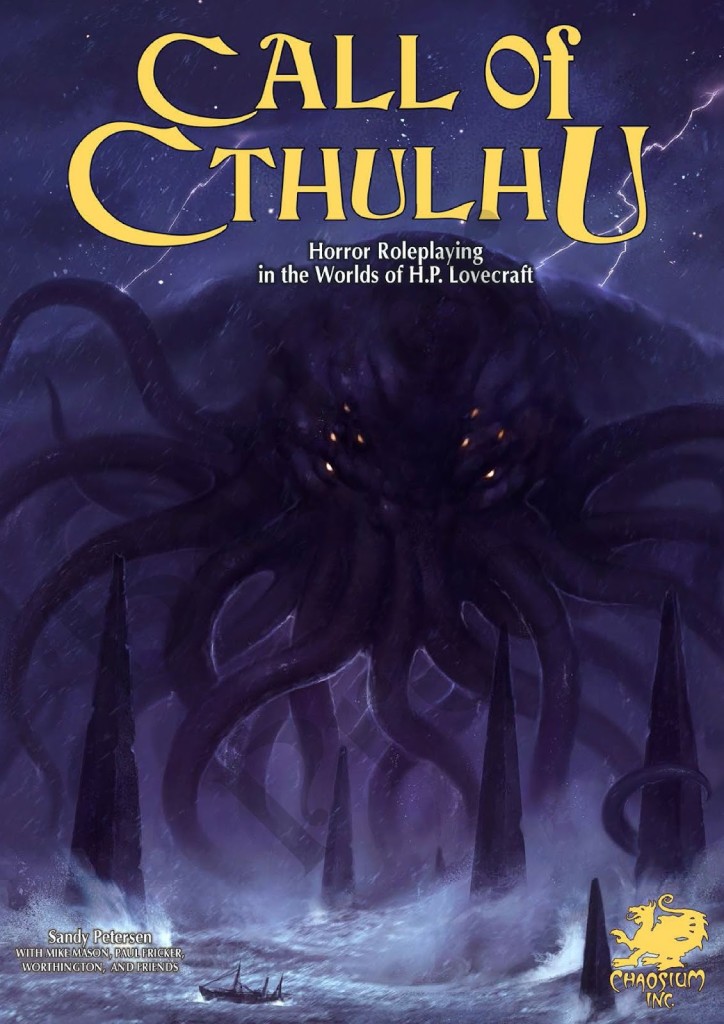
What is a Tabletop Roleplaying Game?
For decades, we just discussed “roleplaying games” (RPGs) with no other distinction. An RPG is a game in which players take on characters and go on some kind of adventure, solve a mystery, or complete a mission. Usually, there is one player who is in charge of running the game and challenging the players. In D&D, that person is called the Dungeon Master (DM). In Call of Cthulhu, that person is called the Keeper.
A tabletop roleplaying game (TTRPG) is an RPG played in the same way we did in the 80s with a group of people sitting around a table, rolling dice, and referring to physical copies of books to play the game. The term TTRPG distinguishes that sort of RPG from other kinds. For instance, a VTRPG is a virtual tabletop roleplaying game. These games are run like a TTRPG except they are played over the internet like some kind of Zoom conference call. Then there are the myriad forms of computer games which are also RPGs but have nothing to do with the sort of game I’ll be discussing in this article.
What is Call of Cthulhu?
Call of Cthulhu (CoC) is a TTRPG that has been around since 1981, which makes it almost as old as D&D. It was created by Sandy Petersen and based primarily upon the horror fiction of H. P. Lovecraft though it also pulls in references from Robert W. Chambers, Robert E. Howard, Clark Ashton Smith, and many of the pastiches that came out after Lovecraft’s death in 1937.
The game gives players a chance to live the life of one of Lovecraft’s protagonists. These are often ordinary people thrown into extraordinary situations. The game focuses on investigations in order to solve a mystery which usually involves some of the Mythos from Lovecraft’s weird fiction. As such, CoC has developed a reputation among fans of roleplaying games: you play until your character either dies or goes insane.
Though CoC invented the use of insanity as a mechanic and combat is often deadly, the game has this reputation because of 1) poorly run games, 2) stupid decisions by players, or 3) a game experience that’s limited to one-shot, demonstration scenarios that aren’t meant to last more than a few hours. These games should be thought of as a horror movie in which success, much less survival, is not guaranteed.
Though it’s been around almost as long as D&D there are significant differences between the two games in character creation and how the game is played.
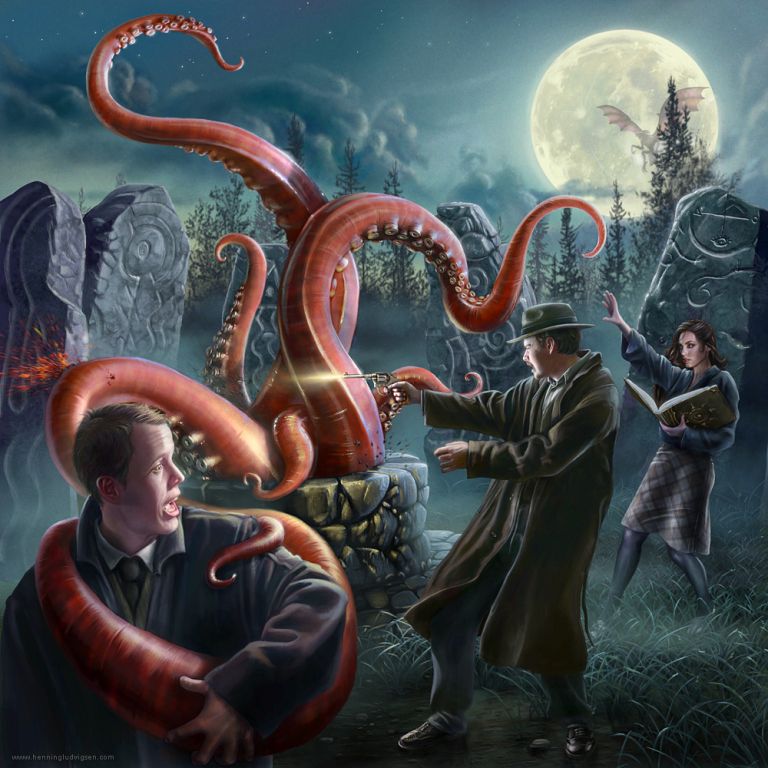
Character Creation
In D&D, player characters are called “adventurers,” but in CoC, they are called “investigators.” This first distinction should give you a good idea of the major difference between the two games. Investigators are just everyday humans. One might be a psychic, a military veteran, an accountant, a private detective, or even a world-renowned scholar of antiquities. But otherwise, they are just like anyone on the street.
Unlike in D&D, there are no classes. Instead, players choose an occupation. Everything I listed in the paragraph above is an occupation that one can play in CoC (yes, including the accountant). With D&D, a class gives the character abilities that are usually not available to other classes. But in CoC, the choice of occupation doesn’t limit what the character can do but describes what they are most likely good at when they start. After all, an accountant can shoot a machine gun, but the military veteran is probably better at it.
The difference between occupations is their skills.
Skill Mechanics
During character creation, the player will get assigned skill points based on the occupation they choose. As you’d expect, a military veteran is going to get more skill points in firearms and an accountant will get more points in…well…accounting. But players are also given some extra points to put in whatever skills they want. So that accountant could spend a lot of weekends at the gun range and be pretty handy around a rifle.
Here’s a selection from the few dozen or so skills in the game:
• Appraise (determining something’s value)
• Charm (impressing someone)
• First Aid (keeping someone alive during combat)
• Library Use (researching)
• Psychoanalysis (helping characters recover from the mental trauma of investigations)
These skills are assigned a percentage. For instance, our world-renowned scholar of antiquities might have a 60% in Archeology, the skill of knowing about ancient artifacts. So when our scholar is presented with a strange statue made from an unknown black stone, the player rolls dice and tries to get a result of less than 60. If the player succeeds, then the scholar knows something about the statue. If they roll higher than 60, then the scholar either doesn’t know anything about the statue or might even get something wrong and think they know something when they’re actually incorrect. As you can see, the higher the skill, the less likely a character is to fail at a skill. Of course, our accountant with a 1% in Archeology doesn’t stand much of a chance.
Unlike in D&D, characters don’t acquire experience points as the game progresses. There are no levels in CoC. Instead, when a character succeeds at a skill roll, the player puts a little check next to that skill. At the end of the game session or scenario (depending on what the Keeper wants), the player then can attempt to raise that skill. So, the more a character tries new things and is successful, the more likely they are to become better at it. Nothing succeeds like success!
Skills are also an integral part of combat in the game.
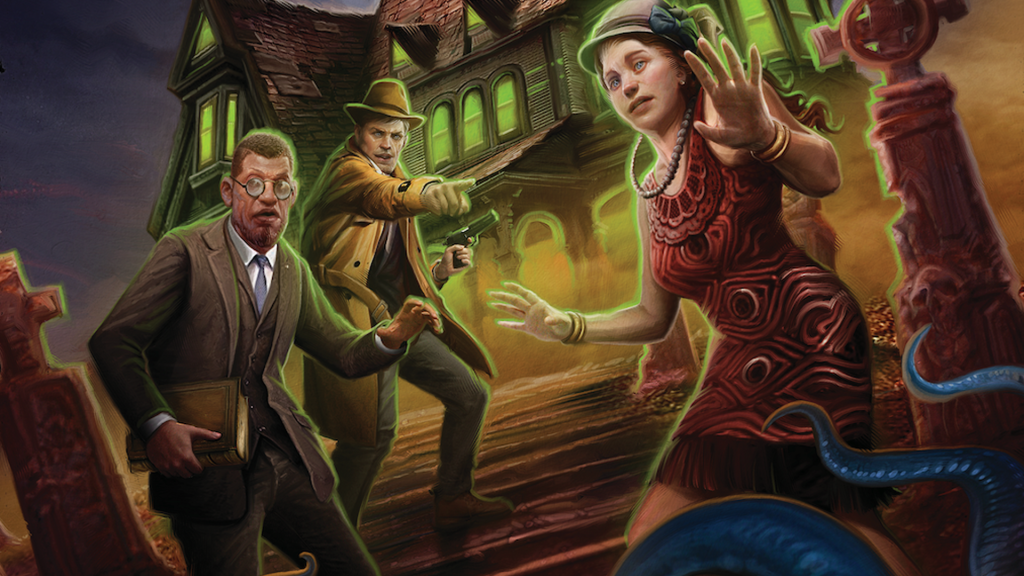
Combat
In CoC, combat skills are just like any other skill, and the mechanics are essentially the same. If a character wants to shoot the raving cultist, he rolls against his Firearms skill using the appropriate subskill. (Pistols, rifles, heavy weapons, etc.). Of course, most people won’t politely stand still and let someone shoot at them, so they are going to dodge, hide behind something for cover, or at least wear some kind of body armor. Because of this, combat is a little more complicated than the usual skill tests. But rather than get into all the crunchy details of how combat works, let me highlight some of the ways it differs in CoC versus other RPGs like D&D.
First, there is no such thing as Armor Class (AC). An attacker rolls a combat skill to hit the defender who can then decide if they want to dodge the attack or fight back. The attacker and defender roll their appropriate skills and see who is successful. Then the damage is rolled and applied to the loser. Armor is rather rare in the game and only lessens the amount of damage taken rather than making the defender more difficult to hit.
The damage taken by the defender is removed from their current hit points. It is not uncommon for characters to start with as little as 8 or 9 hit points. And because there are no levels, you are unlikely to ever get more than that. And a single shot from a 1911 .45 ACP pistol can easily do 15 points of damage in one shot.
The reputation of CoC as a deadly game is very true. Just like in real life, being shot can instantly kill a character or, at the very least, take that character out of the game for some time as they heal. In CoC, there are no clerics, no healing spells, and no healing potions. Characters can use the First Aid skill to prevent other characters from dying, but that’s as close as it gets. Otherwise, healing can take weeks or months and may result in permanent damage to the character. Take an arrow in the knee? You might have a limp for the rest of your life.
The upside to such a deadly combat system is that it forces players to think tactically. There won’t be a fighter with 157 hit points in a full suit of plate armor with a shield standing in a doorway taking all the hits while the cleric stands safely in the back of the party and casting healing spells to keep him alive. In CoC, players have to think of ways to protect themselves while trying to beat the bad guys.
This creates a combat system that is dynamic and fun.
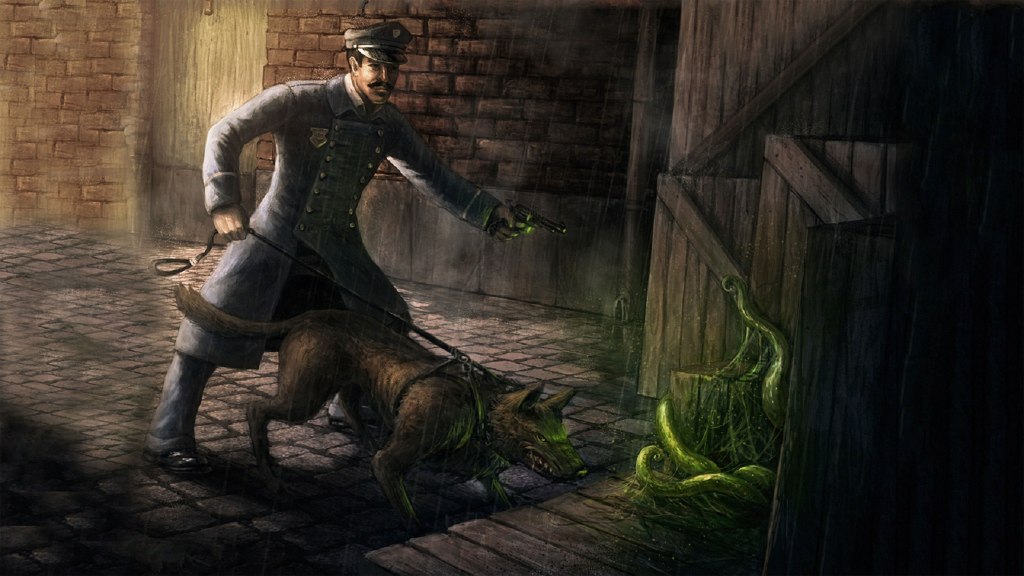
Sanity
One of the other reputations of CoC is that characters will eventually go insane. CoC was the first game that I’m aware of that created a system by which characters are affected by the things they see and do. No wizard in D&D has ever had to risk going mad from summoning a demon. But in CoC, just reading about one can drive a character insane.
As the title says, this is a horror roleplaying game in the world of H. P. Lovecraft. Anyone familiar with his stories knows that insanity was an integral part of his fiction. And this insanity wasn’t due to some failing on the part of the characters. They were driven mad by understanding the true history of humanity and the actual nature of the universe. In CoC, “knowing isn’t half the battle” and “ignorance is bliss.”
At creation, characters will have a certain number of Sanity Points. Unlike hit points, these can be as high as 100 and can rise and fall (but mainly fall) during the life of the character. Whenever a character comes across something awful (the rotting corpse of their best friend) or becomes aware of the truth about our world (sees an actual Deep One for the first time), then the character must make a sanity test.
This is done by rolling dice and trying to get under the character’s current sanity. If the character fails the roll, then they lose a number of Sanity Points based upon what it was they experienced. But some things are so disturbing that the character may lose some Sanity Points even if they succeed. If a character loses all of their Sanity Points, then they become permanently insane and are essentially dead as a character.
Though some people think of Sanity Points as another form of hit points, the sanity system is really a great tool for roleplaying. For instance, if a character loses five or more points in one instance, they go temporarily insane. This doesn’t mean that they become a drooling vegetable (though that’s a possibility), but they could also flee by any means necessary, convinced that singing is the best way to resolve the situation, or obsessed with getting a precious item back from a certain Hobbitses.
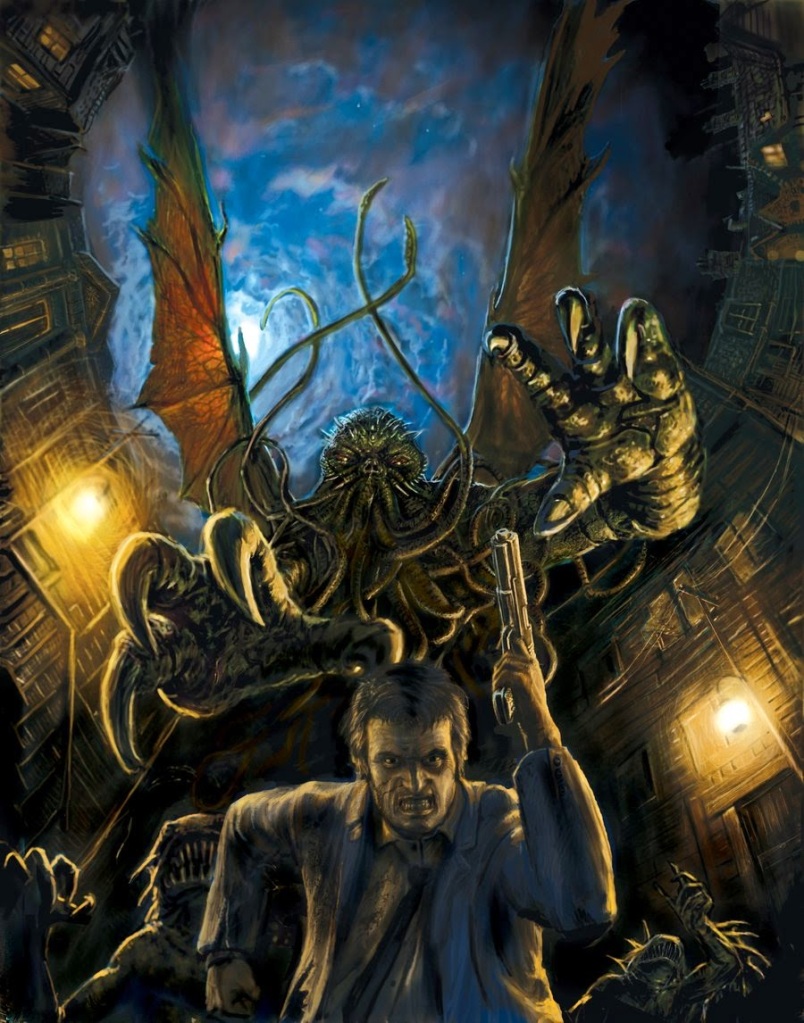
Magic
For those used to D&D and the fantasy genre in general, magic is an important and common part of the game. This is somewhat the case in CoC. Just like in the fiction of H. P. Lovecraft, spells, witches, and necromancers are a part of the game. But also like in his fiction, these are not the purview of normal humans. Even understanding that magic Is real challenges the preconceived notions of what constitutes reality. As such, using spells drains a character’s sanity and maybe even hit points.
Does this mean that no one can use magic in CoC? No! But it does change the way the players think of magic and how capricious they are in its use. There are no frivolous or utilitarian spells in CoC. No one casts a spell at a party to impress chicks. (Well, unless they’re an insane cultist searching for new recruits.) There is no “light” spell. (Well, unless it involves using your own rotting eyeball that you cut out with an obsidian blade during a dark moon.)
In CoC, magic is dark, strange, and scary. It’s something that only desperate characters would study. Whether they are desperate for survival or desperate for power is up to the player.
Ways to Play
CoC can be played in a variety of ways. The original game was conceived to take place in the United States during the 1920s, the time period in which H. P. Lovecraft wrote most of his fiction. But the game can also be played during the modern era. Also, there are many supplements that give players and Keepers options to play in Australia, Berlin, or Harlem. Also, games can take place in the Wild West, Ancient Rome, or the Middle Ages.
Pulp Cthulhu is a variation of CoC that puts the game in the 1930s and follows more of the action-packed pulp fiction of that time. Characters usually have more options, and the system allows for more survivability. Globetrotting to foil some world-ending plan is a common theme in these games.
Another form of CoC is Delta Green. These games follow a short plot point at the end of Lovecraft’s “The Shadow Over Innsmouth” in which federal agents descend upon the town to clear out the dangerous and degenerated inhabitants. Delta Green plays with the idea of what it would mean if the US Government became aware of the horrors of the universe and allows players to play characters along those lines. Think “X-Files” meets “Call of Cthulhu.”
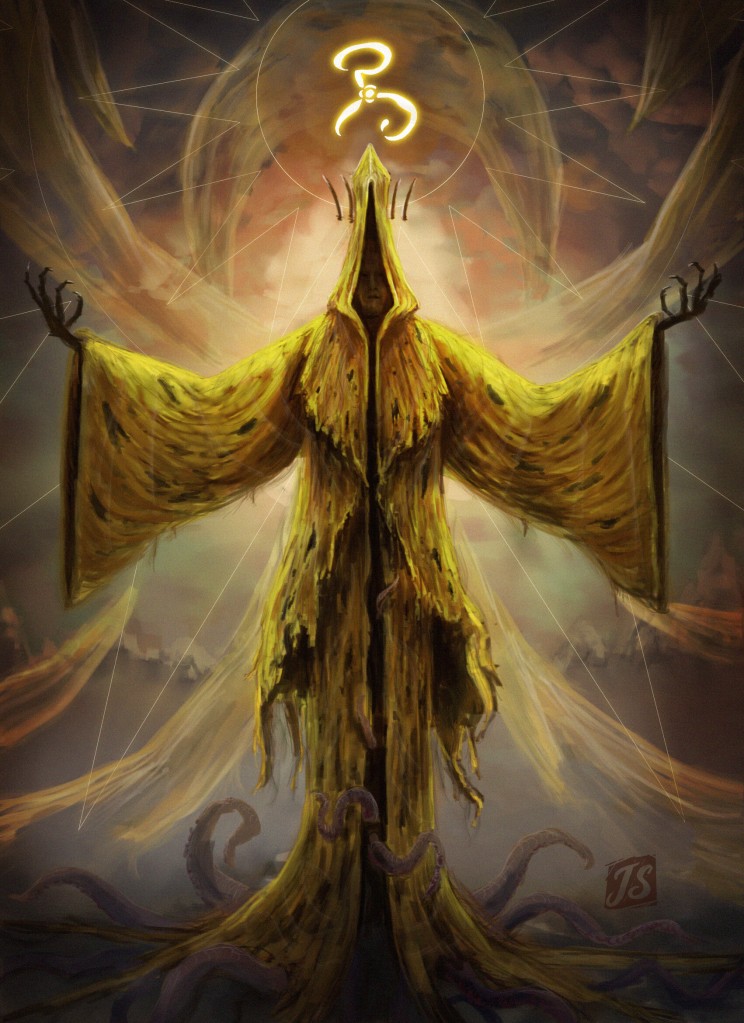
Final Thoughts
Call of Cthulhu has been one of my favorite games for years. Unfortunately, I haven’t had many opportunities to play it because either not enough people know about the game or they have no interest in playing it. This article was meant to address the first issue. But let me explain who this game is for.
First, it’s a horror game. Themes of murder, suicide, abuse, and insanity are quite common. Players have to be ready to accept these dark themes in order to really enjoy CoC. If you love horror movies, then this game is for you. If you’re rather squeamish, then you either should stay away or talk with your Keeper about how much you’re willing to deal with. After all, this is a game, and games are supposed to be fun.
Second, being a horror game, characters can die or become changed in ways that aren’t beneficial to the character. Players have to be ok with losing control over their character’s destiny. Unlike in D&D and most other RPGs, the player can’t really plan out the development of their character as they develop. Sometimes things go sideways during a scenario that no one can predict.
Third, being a game focused on investigations, it is great for players who love mysteries and trying to solve them.
This game is certainly for people who like being surprised about where their character goes in the future. This is one of the things that I like about the game. For instance, our accountant might have never heard of or experienced anything supernatural. But through no fault of his own, he gets pulled into an investigation for which he is completely unprepared.
Having survived and learned that monsters are very, very real, how does he respond? Does he get to the gun range and the gym to prepare for the next fight? Does he seek out ancient tomes that might help explain what is happening to the world? Does he break every accounting ethic he knows to embezzle money from his clients to fund a secret society dedicated to fighting those monsters? What does he do when he loses his job as an accountant? What does he do when he loses a hand because a Deep One bit it off?
This is the sort of thing that keeps me going back to the game.

Cliff Hamrick, as well as being a counselor in private practice, is also an author. Follow this link (https://www.amazon.com/stores/Cliff-Hamrick/author/B081X9QZLC) to view his books that are available from Amazon.com.

Pingback: Sensor Sweep: Black Mask, Call of Cthulhu, Mammoth Adventure, Lin Carter – castaliahouse.com